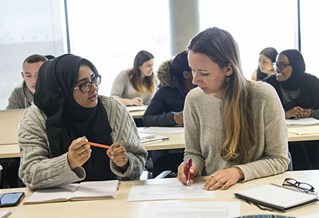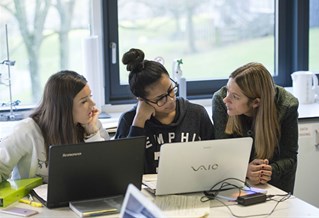
A route into teaching for you
Our PGCE programme includes primary, secondary and further education courses. We offer two primary courses and 10 secondary courses ranging in subjects from physics to physical education. We also offer a School Connect PGCE with our partner schools, the School Direct Salaried programme and the Teacher Apprenticeship.
Our part-time early years course is designed for those already working with children aged from birth to five. Achieving Early Years Teacher Status (EYTS) enables you to take on higher level and leadership roles.

Outstanding facilities
Our specialist classrooms replicate those used in schools so you’ll feel at home when you go on your school-based training and start your career.
Our Curriculum Centre at Falmer is home to more than 30,000 specialist resources, spanning all national curriculum subjects and includes games, DVDs and a comprehensive collection of children’s books.
For Physical Education PGCE students we have extensive on-campus facilities including grass football pitches, a swimming pool and a sports hall.
Take a virtual tour of some of our facilities:

Varied school-based experience
You will benefit from our partnerships with over 600 schools and colleges where you’ll gain school-based training in a variety of settings – large, small, rural and urban.
Our staff will ensure that you are well prepared before your school-based training, and that you have all the support and guidance needed to make the most of these opportunities.
School-based training will enable you to demonstrate and grow your knowledge and make valuable school contacts which will help when you are looking for your first teaching role.

Career success
Our trainee teachers benefit from excellent employment rates after graduation that are consistently above the sector average.
University of Brighton trained teachers are highly sought after by our partnership schools and are known for their creative and innovative approaches to teaching.
Many graduates secure teaching jobs with the schools where they spent their placement, take on mentoring and leadership roles or opt for specialist roles such as special education needs.

Learn with experts
You will be taught by a highly qualified and enthusiastic team with an outstanding national reputation.
Our staff were teachers themselves prior to their academic career so are fully experienced in the classroom. They will provide all the support and guidance you need to ensure you gain classroom confidence.
Research and professional expertise and interests are hugely varied across the team and tutors harness their passion and enthusiasm in support of their students.

Supporting your career
We will continue to support you after you qualify through our Early Career Teachers support programme, so you won’t have to start your career on your own. This ranges from offering advice to providing materials to support you in the classroom.
We also offer an Education MA which will enable you to develop in-depth knowledge of a particular subject.